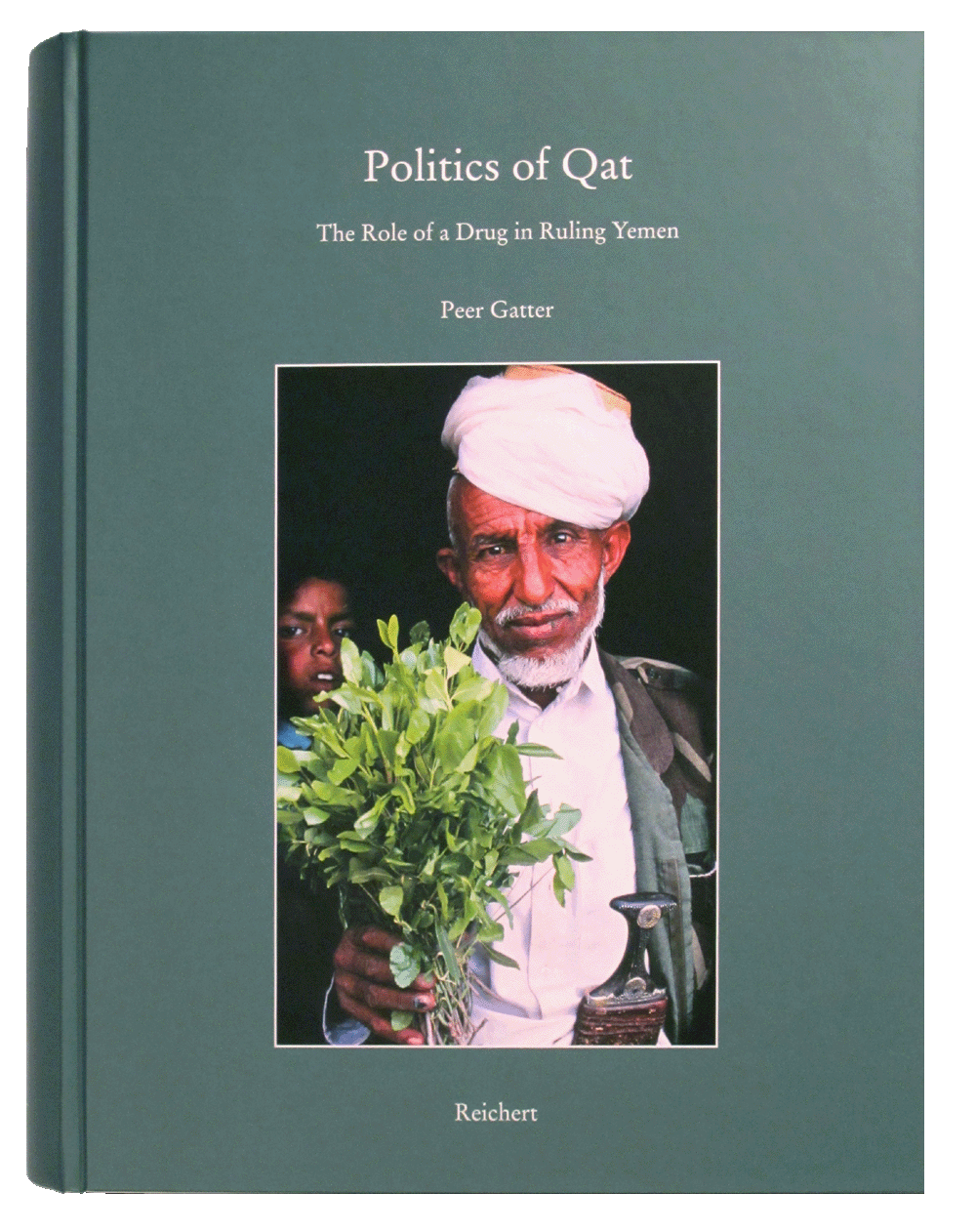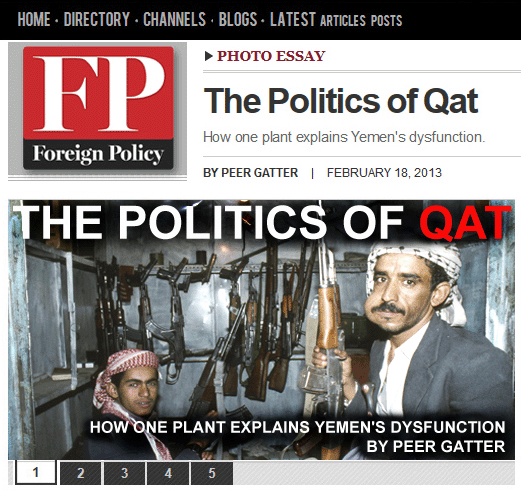Politics of Qat - The Role
of a Drug in Ruling Yemen
by Peer Gatter
For Imam Yahya, one of Yemen's
last kings, qat was a delight that he praised in poems. For his
adversary, the revolutionary al-Zubayri, the plant was the "devil
in the shape of a tree".
Still today the views on qat greatly diverge. For some, qat
farming is the perpetuum mobile of Yemen's rural economy and qat
chewing an age-old social pursuit that has helped to preserve Yemeni
identity in a rapidly changing world. For others, qat is the
main inhibitor of human and economic development in Yemen and is to
blame for poverty and corruption, the depletion of Yemen's water resources
and the country's sloppy approach to fighting Islamist terror.
While some believe that qat chewing was the very motor of Yemen's
"Arab Spring", others hold it responsible for Yemen's muddled revolution
with its high blood toll. In internet blogs even al-Qaeda, its
affiliates, and sympathizers discuss the pros and cons of the drug,
and a number of Yemeni suicide bombers have met their fate with qat-filled
cheeks. A final decision of al-Qaeda on what stance to adopt
towards the drug has seemingly been postponed. The Jihadists want to
avoid alienating Yemen's population with a premature ban of the popular
stimulant before having gained firm control over the country. Al-Qaeda
has learned from the mistakes of its Islamist sister organization, the
al-Shabab militia in war-torn Somalia.
With Yemen's 2011 "Youth Revolution", a decade of half-hearted qat policies and missed opportunities has come to an end - a decade, however, that has succeeded in lifting the veil of silence that was cast over qat in media and politics after President Ali Abdullah Salih came to power in 1978. This whitewash had been part of a ruling bargain between the Salih regime and the unruly tribes that had imparted highland Yemen several decades of relative stability and Salih a 33-year rule.
With the forecast depletion of Yemen's oil and gas reserves within the next decade, the economic importance of qat will further increase and will bring about an important shift in the balance of power from the central government towards the qat producing highland tribes. The challenge of addressing the qat problem is thus tremendous for Yemen's policy makers. While the transitional government is hesitant about its future qat course and anxious not to open a "war" on yet another front, Yemen's anti-qat activists have seized the current, favorable climate of change. Emboldened by Yemen's revolution and the ouster of President Salih they have recently launched a series of campaigns against the drug, dubbed a "revolution on one's self ".
Order the
Book
- Link
to Amazon USA
- Link
to Amazon Germany
- Link
to AbeBooks.com
Vol.
20 of the series Jemen-Studien (Yemen Studies) of the Ludwig Reichert
Verlag, Wiesbaden, 2012.
ISBN 978-3-89500-910-5 , 880 pages (hard cover, size 280 x 210 mm),
441 black & white illustrations, 79 color illustrations, 29 diagrams
& 27 maps.
You can order the book also directly from the publisher: Email:
<info@reichert-verlag.de>

Table of Contents
Prologue
Sample chapter:
Zaydi Insurgency - The Role of Qat in Sa'da Warfare
Sample
chapter: Qat and
Yemen's "Youth Revolution"
Sample
chapter: How Qat
changes the Island of Socotra
Map
& color plate section (selected pages) (large file:
18 MB)
Index of the Book
Qat Publications
by Peer Gatter
Table
of Contents ![]() (Arabic
version)
(Arabic
version)
Prologue
![]() (Arabic version)
(Arabic version)
Editor's Preface
Links to further Studies by the Author
| There are few publications regarding Yemen that omit the phenomenon of qat. Of the abundance of books and articles dedicated to this drug, not a small number address the question of whether qat is in fact a 'drug'. Even within the European Union, until today this question is discussed controversially: In Germany qat is banned, in Great Britain it is legal, and in the Netherlands a potential ban is debated fervently at present. Is not everything yet known about this substance that shapes the daily life of Yemen and of Yemenis to a greater extent than so many other things? A closer analysis of the literature on qat shows that we are very well informed about the history, pharmacology, biochemistry, the health effects as well as the social aspects of qat. But a literature review soon reveals that little is thus far known on the economics, not to mention the politics, of qat. The political dimension of the phenomenon - a pivotal topic - has so far been almost entirely neglected by scientific research: In what way is qat an instrument of power in the political sense? Peer Gatter presents a remarkable work hereto, based on his intensive knowledge of the subject matter: For many years he lived in Yemen and, at the periphery of his work for the United Nations and the World Bank and as an advisor in various Yemeni ministries and member of international committees, gathered an impressive material on qat - always accompanied by participant observation and numerous field surveys. He thereby gained deep insights into social, economic and political processes surrounding the qat issue that had so far remained sealed even to the eyes of experts on the region. Peer Gatter was given access to materials that open entirely new perspectives on the "phenomenon of qat". The revolutionary movements that have held Yemen in their grip for the past year have lent the study further relevance, as the qat problem plays a central role in this context. Indeed, it can be said without hesitation: power-plays, corruption, clientelism, and the personalized political system of Yemen become understandable only if the qat factor is appropriately taken into account. In this respect, the work in hand stimulates a deeper understanding of the functioning of Yemeni society. It not only encapsulates previous knowledge on qat, but also embellishes it with a highly important component - the political dimension. | |
Horst Kopp, June 2012 |
|
- The
Politics of Qat - How one Plant Explains Yemen's Dysfunction
(Foreign Policy, Photo Essay, Feb. 18, 2013) - Politics
of Qat in Yemen
(Presentation at the Yemen Conference - SOAS, London, Jan. 2013) - Yemen
- Towards Qat Demand Reduction
(World Bank Report, 2007) - Yemen
- Towards Qat Demand Reduction
 (Arabic
version)
(Arabic
version)
(World Bank Report, 2007) - The
Ismailis’ "War" against Qat in Haraz
Between Community Mobilization and Politico-Economical Constraints
( Chronique Yéménites, 2007) - Towards
Practical Policies for Limiting the Expansion of Qat Cultivation
(Qat Policy Review Workshop - Sana’a, June 29-30, 2008) - Financial
Mechanisms of Decentralization and the Taxation of Qat
(in: Societé Civile, Associations et Pouvoir Local au Yémen, 2008) - Die
Droge Qat als Motor der jemenitischen Dezentralisierung
(in: Der Vordere Orient. Politik, Wirtschaft und Gesellschaft, 2007) - Yemen
- First National Conference on Qat
Under the auspices of H.E. the President of Yemen, Mr. Ali Abdula Salleh. Conference Discussion Materials. Sana'a, April 6-7, 2002 - Yemen
- First National Conference on Qat
 (Arabic
version)
(Arabic
version)
Under the auspices of H.E. the President of Yemen, Mr. Ali Abdula Salleh. Conference Discussion Materials. Sana'a, April 6-7, 2002

